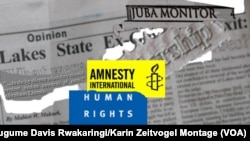Two leading human rights groups slammed South Sudanese authorities on Friday for abusing the rights of journalists and creating a climate of fear in the country at a time when it needs free speech and debate to end a deadly conflict.
"South Sudan’s authorities, especially the National Security Service (NSS) have harassed, intimidated, and arbitrarily detained journalists while the government has failed to pass key laws to protect freedom of expression,” Amnesty International and Human Rights Watch said in a report called "The Price of Silence."
Journalists “cannot report freely on the ongoing conflict and newspapers are unable to participate in open debate on how the country could move towards sustainable peace without fear of retribution by state security forces,” the report says.
Interviews with opposition chiefs banned
Journalists have been banned from interviewing opposition leaders or reporting on human rights violations by government forces. Those who violate those unwritten rules have been “harassed, intimidated, summoned for questioning by the NSS and told to leave the country,” the report says.
Newspapers have been ordered to shut down altogether, or have had issues or entire print runs seized.
The report says the NSS is the biggest violator of journalists’ rights.
“Since 2011, this body has been operating without a legal mandate and, especially in Juba and other state capitals, has carried out unlawful arrests and detentions contributing to undermining freedom of expression,” the report says.
Draft legislation brought before the National Assembly in May would formalize the NSS’s status, but not in a way that would help media rights or free speech.
“The draft grants the NSS sweeping powers to arrest and detain without guaranteeing basic due process rights. It also provides broad powers to engage in communications surveillance, and does not require judicial oversight,” the report says.
Minister in the Office of the President Awan Gual said security agents who harass the media are acting on their own, not on orders from the government.
"The incidents that happened -- they happened not as policy of the country," he said.
Fearful atmosphere
The crackdown on the media has resulted in an “increasingly fearful atmosphere” among journalists “…at a time when South Sudan most needs independent voices to contribute to discussions about how to end the political crisis and internal armed conflict,” said Elizabeth Ashamu Deng, South Sudan researcher at Amnesty International.
“Abuses by the National Security Service… have especially contributed to a growing atmosphere of fear among journalists and human rights defenders,” she said.
Many journalists “have resorted to self-censorship, carefully crafting articles and statements to avoid antagonizing the government, opting out of public appearances or television and radio interviews,” while others are reporting less, the rights groups say.
Others have been targeted with violence, and more still have left the country, the report says, citing a lawyer in Juba who said, “If you stay, you pay the price of silence.”
“Right now journalists and commentators cannot do their work and report freely on the ongoing conflict without fear of retribution by state security forces,” said Daniel Bekele, Africa director at Human Rights Watch.
“We’ve seen the NSS and other authorities erode freedom of expression since South Sudan’s independence through abusive practices: these should end now,” Bekele said.
Karin Zeitvogel contributed to this story from Washington D.C.




